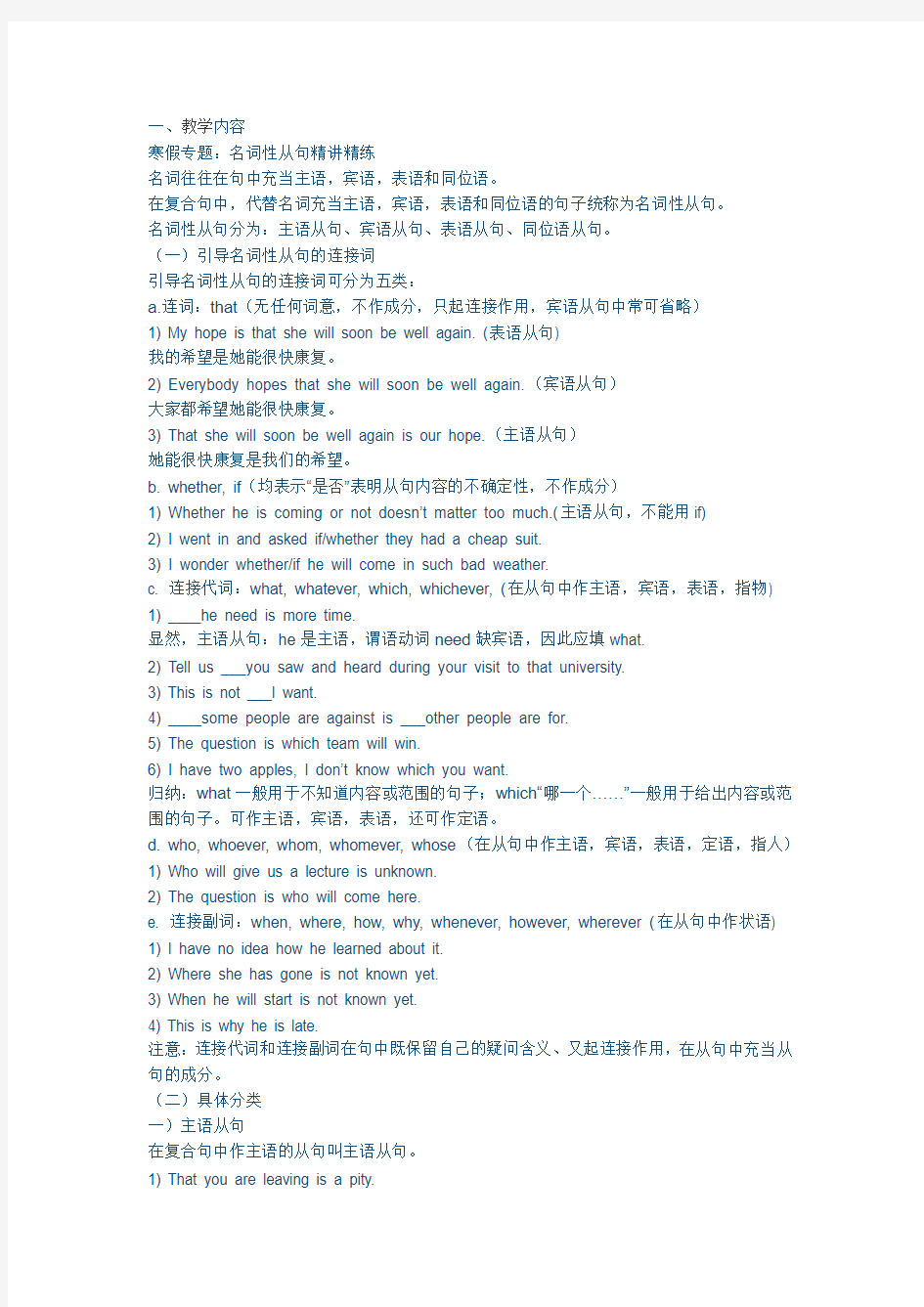名词性从句精讲精练

- 1、下载文档前请自行甄别文档内容的完整性,平台不提供额外的编辑、内容补充、找答案等附加服务。
- 2、"仅部分预览"的文档,不可在线预览部分如存在完整性等问题,可反馈申请退款(可完整预览的文档不适用该条件!)。
- 3、如文档侵犯您的权益,请联系客服反馈,我们会尽快为您处理(人工客服工作时间:9:00-18:30)。
一、教学内容
寒假专题:名词性从句精讲精练
名词往往在句中充当主语,宾语,表语和同位语。
在复合句中,代替名词充当主语,宾语,表语和同位语的句子统称为名词性从句。
名词性从句分为:主语从句、宾语从句、表语从句、同位语从句。
(一)引导名词性从句的连接词
引导名词性从句的连接词可分为五类:
a.连词:that(无任何词意,不作成分,只起连接作用,宾语从句中常可省略)
1) My hope is that she will soon be well again. (表语从句)
我的希望是她能很快康复。
2) Everybody hopes that she will soon be well again.(宾语从句)
大家都希望她能很快康复。
3) That she will soon be well again is our hope.(主语从句)
她能很快康复是我们的希望。
b. whether, if(均表示“是否”表明从句内容的不确定性,不作成分)
1) Whether he is coming or not doesn’t matter too much.(主语从句,不能用if)
2) I went in and asked if/whether they had a cheap suit.
3) I wonder whether/if he will come in such bad weather.
c. 连接代词:what, whatever, which, whichever, (在从句中作主语,宾语,表语,指物)
1) ____he need is more time.
显然,主语从句:he是主语,谓语动词need缺宾语,因此应填what.
2) Tell us ___you saw and heard during your visit to that university.
3) This is not ___I want.
4) ____some people are against is ___other people are for.
5) The question is which team will win.
6) I have two apples, I don’t know which you want.
归纳:what一般用于不知道内容或范围的句子;which“哪一个……”一般用于给出内容或范围的句子。可作主语,宾语,表语,还可作定语。
d. who, whoever, whom, whomever, whose(在从句中作主语,宾语,表语,定语,指人)
1) Who will give us a lecture is unknown.
2) The question is who will come here.
e. 连接副词:when, where, how, why, whenever, however, wherever (在从句中作状语)
1) I have no idea how he learned about it.
2) Where she has gone is not known yet.
3) When he will start is not known yet.
4) This is why he is late.
注意:连接代词和连接副词在句中既保留自己的疑问含义、又起连接作用,在从句中充当从句的成分。
(二)具体分类
一)主语从句
在复合句中作主语的从句叫主语从句。
1) That you are leaving is a pity.
你要走,真遗憾。
2) Whether the football game will be played depends on the weather.
足球比赛是否举行将视天气而定。
3) What he wants to tell us is not clear.
他要跟我们说什么,还不清楚。
4) Who will win the match is still unknown.
谁能赢得这场比赛还不得而知。
5) Where the English evening will be held has not yet been announced.
英语晚会将在哪里举行,还没有宣布。
6) It is known to us how he became a writer.
我们都知道他是如何成为一名作家的。
有时为避免句子头重脚轻,常用形式主语it代替主语从句作形式主语放于句首,而把主语从句置于句末。主语从句后的谓语动词一般用单数形式。常用句型如下:
(1)It + be + 名词+ that从句
① It’s a pity that we can’t go.
很遗憾我们不能去。
② It is a fact that English is being accepted as an international language.
英语正在被人们接受为国际语言,这是事实。
③ It is no wonder that he is not hungry; he has been eating sweets all day.
难怪他不饿,他整天在吃糖果。
(2)It + be + 形容词+ that从句
① It is certain that she will do well in the exam.
毫无疑问她考试成绩会很好。
② It is probable that he told her everything.
很可能他把一切都告诉她了。
③ Is it true that the scientist will give us a lecture.
下周那位科学家将给我们作报告是真的吗?
(3)It + be + 动词的过去分词+ that从句
① It is said that Mr. Green has arrived in Beijing.
据说格林先生已经到了北京。
② It is reported that China has sent another man-made earth satellite into orbit.
据报道中国又成功地将一颗人造地球卫星发射进入轨道。
(4)It + 不及物动词+ that 从句
① It seems that Alice is not coming to the party at all.
爱丽丝似乎不来参加晚会。
② It happened that I was out that day.
碰巧那天我外出了。
(5)其他情况
① It doesn’t matter whether she will come or not.
她是否来无关紧要。
② It makes no difference where we shall have the meeting.
我们在哪里开会毫无区别。
